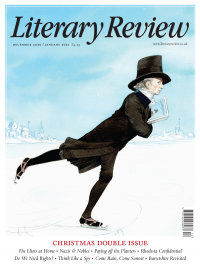Thomas Williams
Among the Drinkers of Ink
Randomly Moving Particles
By Andrew Motion
Faber & Faber 120pp £14.99
The Late Sun
By Christopher Reid
Faber & Faber 88pp £14.99
In the Lateness of the World
By Carolyn Forché
Bloodaxe 80pp £12
Across these collections, by four poets born within six years of each other (one, Christopher Reid, has even written a poem on the subject of ‘Boomers’), certain preoccupations seem to recur: an interest in travel and migrations; a sharp awareness of the environment and the damage it has suffered; and an interest in ‘lateness’ and endings – making sense of the past while nervously awaiting the future.
Two long poems dominate Andrew Motion’s latest collection, Randomly Moving Particles. The title poem is a particular triumph: a fragmentary work that shifts between micro and macro scales of vision, encompassing the political, the personal and the planetary. He namechecks Brexit and Trump (‘false, lacking the normal signs of difficulty in thinking what/to say when performing the chosen word-stream’). At the same time, there is a thread of personal loss and grief that carries through from its opening lines: ‘That Christmas I ran through fire in London/carrying my old father across my shoulders’. Indeed, it’s the elegiac moments that are particularly affecting, as in the final image of his father: ‘his mind/he abandoned/while preparing to set his jaw/and turn his face to the wall’.
We have gestures to Larkin – ‘the friendly arrow-shower daily/of email

Sign Up to our newsletter
Receive free articles, highlights from the archive, news, details of prizes, and much more.@Lit_Review
Follow Literary Review on Twitter
Twitter Feed
The era of dollar dominance might be coming to an end. But if not the dollar, which currency will be the backbone of the global economic system?
@HowardJDavies weighs up the alternatives.
Howard Davies - Greenbacks Down, First Editions Up
Howard Davies: Greenbacks Down, First Editions Up - Our Dollar, Your Problem: An Insider’s View of Seven Turbulent...
literaryreview.co.uk
Johannes Gutenberg cut corners at every turn when putting together his bible. How, then, did his creation achieve such renown?
@JosephHone_ investigates.
Joseph Hone - Start the Presses!
Joseph Hone: Start the Presses! - Johannes Gutenberg: A Biography in Books by Eric Marshall White
literaryreview.co.uk
Convinced of her own brilliance, Gertrude Stein wished to be ‘as popular as Gilbert and Sullivan’ and laboured tirelessly to ensure that her celebrity would outlive her.
@sophieolive examines the real Stein.
Sophie Oliver - The Once & Future Genius
Sophie Oliver: The Once & Future Genius - Gertrude Stein: An Afterlife by Francesca Wade
literaryreview.co.uk